Japanese Grammar: Extending an Invitation using 〜ませんか – Review Notes
Today we learned how to extend an invitation in Japanese using the negative question form of the verb 〜ませんか (~masen ka).
If you haven’t learned about the negative form of verbs yet, click here. In this review we will go over what we learned in the video and see some more examples.
………………………………………………………………………………..
Extending an invitation using 〜ませんか
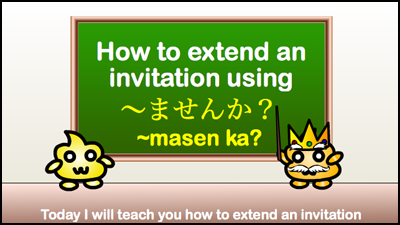
★ Today we learned how to extend an invitation in Japanese using the negative question form of the verb 〜ませんか (~masen ka).
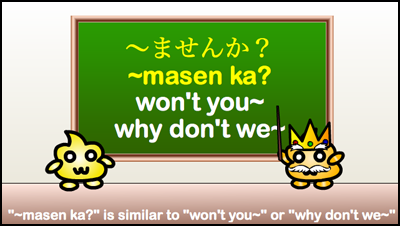
★ 〜ませんか (~masen ka) is similar to “won’t you~” or “why don’t we~” in English.
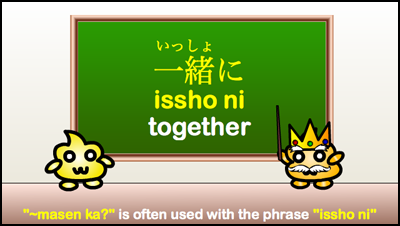
★ When extending an invitation using 〜ませんか (~masen ka) the phrase 一緒に (issho ni), meaning together, is often used.
………………………………………………………………………………..
Example 1:

一緒にテニスをしませんか。
issho ni tenisu o shimasen ka?
Why don’t we play tennis together?
★ In this example, the speaker is inviting the listener to play tennis together.
………………………………………………………………………………..
Example 2:
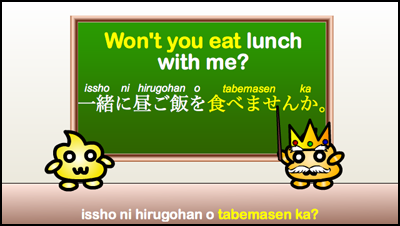
一緒に昼ご飯を食べせんか。
issho ni hirugohan o tabemasen ka?
Won’t you eat lunch with me?
★ In this example, the speaker is inviting the listener to eat lunch together.
………………………………………………………………………………..
Example 3:
一緒に映画を見に行きませんか。
issho ni eiga o mi ni ikimasen ka?
Why don’t we go see a movie together?
………………………………………………………………………………..
Example 4:
一緒に買い物に行きませんか。
issho ni kaimono ni ikimasen ka?
Why don’t we go shopping together?
………………………………………………………………………………..
Example 5:
一緒に勉強しませんか。
issho ni benkyō shimasen ka?
Won’t you study with me?
………………………………………………………………………………..
How to accept an invitation in Japanese:
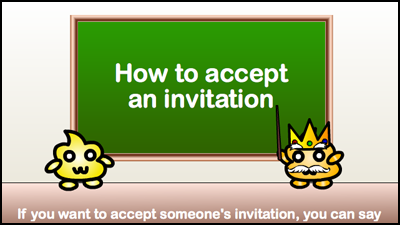
★ If you want to accept someone’s invitation, you can say いいですね (ii desu ne), “that sounds great!”

………………………………………………………………………………..
How to refuse an invitation in Japanese:
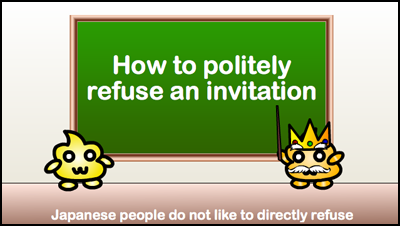
★ Japanese people do not like to directly refuse an invitation.
★ Here are some polite ways that you can refuse an invitation in Japanese:
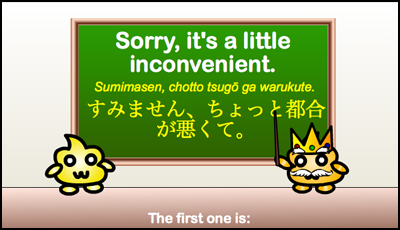
すみません、ちょっと都合が悪くて。
Sumimasen, chotto tsugō ga warukute.
Sorry, it’s a little inconvenient.
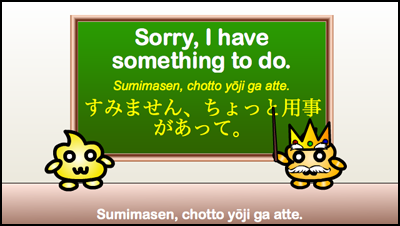
すみません、ちょっと用事があって。
Sumimasen, chotto yōji ga atte.
Sorry, I have something to do.
★ You can also tell them a more specific reason if you have one. For example:
すみません、宿題がたくさんありますので。
Sumimasen, shukudai ga takusan arimasu no de.
Sorry, I have a lot of homework, so…
………………………………………………………………………………..
Conclusion:
Today we learned how to extend an invitation using the negative question form of the verb 〜ませんか (~masen ka). We also learned how to respond both positively and negatively to the invitation in Japanese.
………………………………………………………………………………..
………………………………………………………………………………..
………………………………………………………………………………..










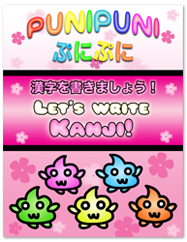


6 comments
Getting a bit tricky! In “shukudai ga takusan arimasu no de”, what role are the particles “no” and “de” at the end playing?
Comment by Oliver Pereira on 01/19/2013 at 10:59 pmNo de is a way to say “so” or “because,” but in this case, the sentence is left unfinished. The sentence could continue like “shukudai ga takusan arimasu no de, kyō wa ikemasen” (I have a lot of homework, so I can’t go today.) but often this last part after “so” is left out because Japanese people do not like to refuse an invitation directly. Instead, they just give the reason (homework), implying that they are too busy or are unable to go(◕ω◕)♪
Comment by PuniPuni on 01/20/2013 at 9:41 amありがとうございます。
Thank you. That’s interesting! I’ve noticed what seems to be a trend in British English, at least around where I live, that people have started leaving a dangling “so” at the end of a sentence. “I have a lot of homework, so…” I never used to hear this, until quite recently. I find this amusing, even though it must surely be unconnected! 😉
Comment by Oliver Pereira on 01/20/2013 at 11:41 amIs しませんから has the same usage here?
Comment by shion on 09/09/2013 at 8:39 amI heard in one Japanese news TV, some reporter used it while reporting about a food, though it was in the last part of the sentence.
しませんから (shimasen kara) has a very different meaning than しませんか (shimasen ka). しません (shimasen) means “do not do (something)” or “will not do (something)” and から (kara) means “so” or “because.” If it was just at the end of the sentence, he was saying something like: “…. will not do …. so,…” If it was just a sentence in itself, it can translate to “I won’t do it, so…” but without knowing the context, it is impossible to know what he is talking about. (◕ω◕)☆
Comment by PuniPuni on 09/10/2013 at 5:06 ami want more learning about the japanese language:)
Comment by renalyn genetia on 06/12/2014 at 7:26 am